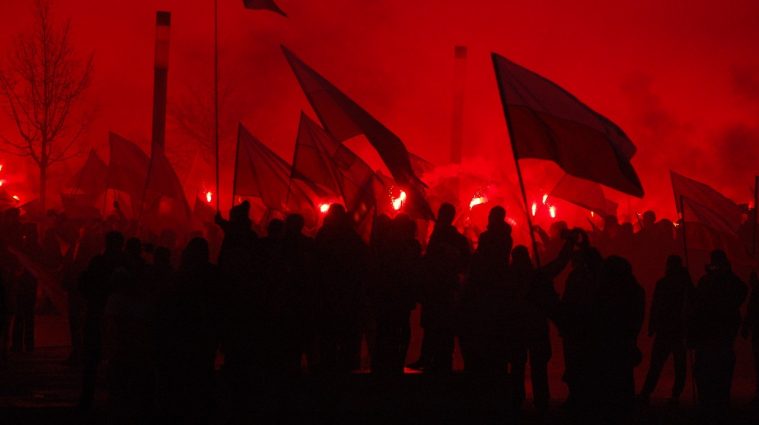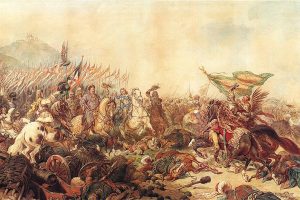Polskość: the legacy of Polish past in its present identity struggles
Caught up between legacies of its history and country’s present socio-political developments, the discourse of Polskość, or ‘Polishness’, is a difficult and at times even a controversial topic. What are some of the symbols of the past still present in the discussion about Polish national identity today?

November 11th marks the Polish Independence Day – a commemoration of the grand moment when after over a century of having been erased from the political map of the world, in 1918 Poland once again became a sovereign state. Once a powerful and tolerant country, internal conflicts have made Poland weak, and as the Romantic idea of national identity was beginning to form, the country’s borders have been repeatedly violated and territories mercilessly invaded (see animation of the shifting borders of Poland throughout ages). The end of World War I finally brought a promise of stability and peace, and once again Poland appeared on the map as an independent state with protected borders. Even though that independence lasted only till the Nazi’s attack in 1939, November 11th is still the day when Poles celebrate their national freedom.
This year's celebration of the Polish Independence Day infamously resonated with the whole world. The largest to this day post-war grouping of far-right, radical groups and organizations from various countries in Europe marched together under the white-and-red flag of Poland, carrying banners embracing this year’s slogan: “We want God!”. Many of the participating organizations have been (up till that point) endorsed, at least ideologically, by the Polish government and its various political and religious leaders. Seeing highly mediatized abhorrent clips from the hatred-fueled event, people around the globe have been asking: is this the new face of Polish patriotism?
Polish self-perception as ‘others’
An answer from many Poles would be a resounding ‘no’, but there is no doubt opinions are divided. The fact remains, however, that Poland is now being internationally recognized through the pervasive focus on events perpetuating discourse of Poland as the 'sick man of Europe' (see some reactions of Polish government to international news ). This selectiveness is disconcerting, and maintains the impression of Poles that their national image tends to be negatively misrepresented, twisted and manipulated in the effort of the West to ‘other’ Poland and its culture.
A cartoon I saw recently well illustrates this sentiment while also pointing out the irony of contradiction in the Polish approach to ‘othering’. The artist drew a simple scene: a Pole sitting next to a Middle Eastern man, an implied Muslim/refugee, resentfully states: “Just because of 60,000 idiots all of the sudden all of us are neo-Nazis” (source: Polish website Cudzoziemiec – taki sam człowiek jak Ty or ‘Foreigner – a human just like you’).
Undeniably Poles are consistently inconsistent in resenting their own non-flattering international image, yet enthusiastically exaggerating the negative and generalizing statements of other ‘others’. Still, it is not my goal to attempt to quantify the process, but rather accept there are internal parallels, many overarching similarities inherent to the dynamics of stigmatization.
In fact, research has shown that Poles generally feel misunderstood and unappreciated, seeing ‘Western’ countries as patronizing and judging Poland with dismissiveness reserved for those inferior (Davies 1998; Galbraith 2011; Galbraith 2014). Such judgment is often perceived as a blunt shift of responsibility and yet another tactic of leaving Poland behind: perpetuation of the type of ‘othering’ that truly has defined Polish national identity in the last several centuries.
It is important to recognize that this ongoing insistence on self-definition through the prism of resisting repression is deeply contextualized in Polish history. A closer look at the past reveals strong formative trends that facilitate a better understanding of the origins defining modern ‘Polishness’.
Legacies of history: betrayal and resilience of the Polish spirit
After occupying a significant place in European political scene (especially in XV-XVII century), in 1795 Poland has effectively disappeared off the world maps as an independent country, split between Russian Tsarina Kathrine the Great, Austrian Emperor Joseph II, and Prussian King Frederick II in three unprecedented acts of partitions.
The partitions were the defining moment for Polish national identity. In the face of international humiliation and territorial aggression experienced at the hands of former allies, Poland seized to exist as a legitimate independent state – but its political difficulties in no way erased or even diminished the importance of carrying on the notion of Polish identity. It is important to remember that these events took place at the exact times of the newly evolving romantic notions that embraced nationalism, and the idea of a modern nation-state. As the concept developed throughout Europe and gained on its prevalence and importance, the fact that Poland has just recently seized to exist as a free country added an distinctive level to self-identification through fighting off the oppressive forces forbidding expression of ‘real’ national identity of the people (Davies 2001:236-237). The coercive attempts to ‘Russify’ or ‘Germanize’ people self-identifying as Poles, who now found themselves living under a new protectorate and a rule of a foreign assailant, only elevated the strongly Romantic perception of national identity and patriotism, where the “bodies were captive, but (…) spirits were free” and “Poland was a prisoner, but its soul was unbound (Davies 2001:172)”. This ‘resilience of the spirit’ remained a defining quality linked to Polish national identity to this day.
Unfortunately in their struggle to regain independence, over and over again Poles found themselves either defeated or left behind (as was the case with Polish Legions fighting for Napoleon Bonaparte, or multiple cases of heroic yet unsuccessful uprisings in XIX and XX centuries) (Kamiński & Korkuć 2016). Also the outcomes of Teheran, Yalta, and Potsdam Conferences were experienced by Poles as an inexcusable desertion of former allies, and being ‘sold’ into the hands of its enemy: Russia. To this day, the West has not yet been forgiven. Eventually in 1989 Poland began its new sovereign existence with a stable territory and a democratic government, but despite being welcomed into the international structures such as NATO, and eventually allowed in the European Union, Poland still holds a historical grudge and treats these gestures of inclusion with deep mistrust (Galbraith 2011; Galbraith 2014; Zubrzycki 2011).
Poland as the “Christ of nations”
The other crucial thread of historical legacy in the knotted yarn of Polish national identity is the image of ‘Poland as the Christ of nations’.
Poland for centuries has defined itself as a Christian fighter, protector of the Eastern borders against invasions of non-believers, and a suffering martyr that continues to fight for the freedom of all nations. Stemming also from the times of Romanticism, Poles have gradually adopted the narrative in which the partitions resembled the Crucifixion, the national spirit an immortal soul, and the resurrection was a promise of the future rising of the Polish nation (Davies 2001). The history of betrayal further fits with this messianic tendency, with the former ‘friendly’ states turning against Poland for their own gain, just as Judas did with Jesus. In other words suffering, betrayal, sacrifice, martyrdom, and the struggle to protect ethnic (here religious) type of identity is one of the leading and most formative forces in the historical construction of Polish national identity.
After successful military actions that stopped ‘Muslim invasions’ of Turks in 1673 and Tatars in 1683 building on the recently intensified by Counter-Reformation importance of Catholicism, role of religion in national identification became more salient. During the partitions a large part of preserving Polishness was focused on protection of the Catholic faith, often under attack and in danger of eradication (especially on the Russian and Prussian territory) (Kamiński & Korkuć 2016). Due to USSR’s admonishing stance on religion, and decades long attempts to diminish the importance of the Church in Poland, the already mentioned tradition of resistance has continued. There can be no doubt of the huge motivating impact that the Catholic Church and Pope John Paul II had on the political events in Poland during 1980s (Davies 2001; Galbraith 2014; Kochańczyk 2012). While many other places experienced progressive secularization as an accompaniment to the democratization and liberalization, it is important to realize that in Poland the fight for democracy was actually led, or at least strongly supported by the Church, and political freedom of today’s Poland is to a large extent a result of Catholicism-encouraged bravery and solidarity (Kochańczyk 2012).
New borders, old perceptions
It seems these historical legacies have imprinted strongly on Polish identity, visible even in the current social and political discourses of patriotism. Even though Poland is politically safer than it has been in centuries, with stable borders and democratic rule, there are still narratives perpetuated by media and politicians that force perceptions of threats to Polish culture and sovereignty (Cichocki 2012; Galbraith 2014). Refugees are the new Tatars against whose attempts to Islamize Europe Polish Christian fighters have a moral obligation and patriotic duty to defend not only their own borders, but also the rest of the world (see Rosary on the borders).

‘Robbed of patriotism’: ‘Polskość’ today
In the recent years discussing patriotism in general has become an increasingly politicized and contentious issue, often immediately conjuring negative connotations to nationalism, xenophobia, and intolerance. Talking about Polish patriotism specifically is a metaphorical equivalent of throwing a proverbial lit match in a pool of gasoline – a statement true both within Polish communities as well as in the international context of confrontation of national vs. outsider perspectives. In foreign eyes to proclaim oneself a Polish patriot instantly classifies a person into the box of prejudice, racism, and socio-political backwardness. To make that statement among Poles can be read as an immediate proclamation of affiliation to the ruling party PiS (Law and Justice) and support for their many controversial decisions. Yet in that metaphorical enclosure of patriots, is there room for progressives and liberals, whose harsh criticism of the current political developments is in their eyes understood as patriotic, caring for the well-being of their state and fellow citizens? Or for those who see the future of progress towards multicultural and more tolerant, encompassing values of Western Europe, yet still value their Polish cultural roots and traditions? What does it mean to be a patriot in today’s Poland?
In reality, Poland’s internal division is reaching an alarming state. For some the value of Poland can only be preserved by protecting it from dangerous, infidel outsiders, and continuing the tradition of the Christian outpost (Davies 1998), the un-appreciated and misunderstood martyr fighting for the good of all nations. For others only incorporation of more progressive, inclusive ideologies can cleanse the image of Poland from its recent, by many perceived as shameful acts, and the value of Poland lies in its potential future.
A famous Polish actress, known also for her political, left-oriented and feminist activism, when interviewed about recent events brought up the issue of how the growing intensification of binary approach to Polish national identity is deepening the divisive tendencies within the population, pushing people towards more extreme positions. “I feel robbed of my patriotism” she stated at one point, a proclamation that somehow resonated with my own recent feelings. What should be done if the legitimized, official political discourse stands in direct opposition to your own idea of national identity? One could of course argue that in some ways this is precisely a continuation of the previously described typical Polish patriotism, where the state itself is often recognized as the main enemy of ‘Polskość’ (Davies 1998; Davies 2001; Galbraith 2014).


